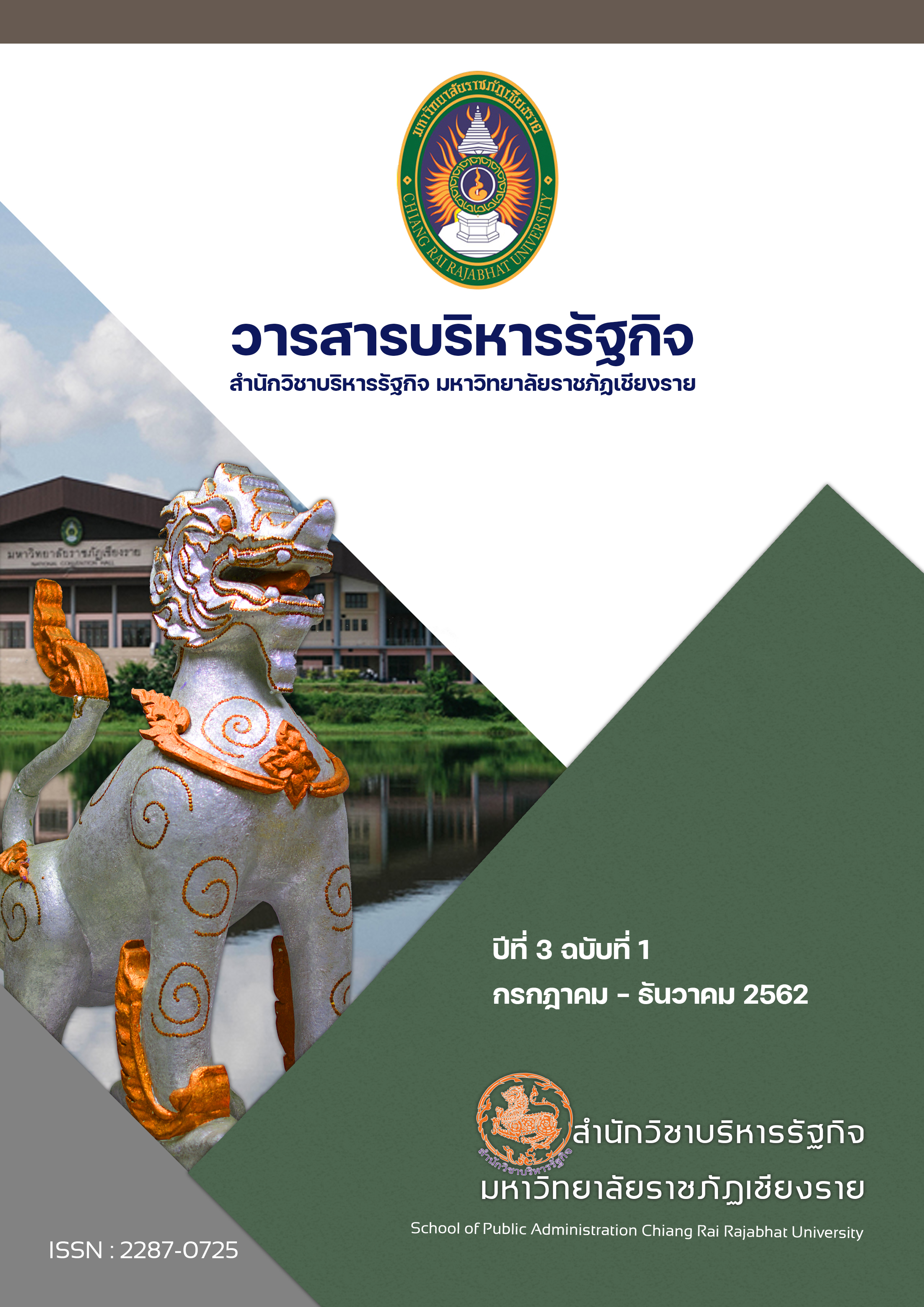Conditions on the Non-communicable Disease (NCD) Prevention Behaviors of the Population of Mae Pao Sub-district, Phaya Meng Rai District, Chiang Rai Province
Main Article Content
Abstract
The objective of this research was to study the factors relating to the non-communicable disease (NCD) prevention behaviors of the population of Mae Pao sub-district, Phaya Meng Rai district, Chiang Rai province. The key informants were 5 healthy residents who took self-health care regularly. The purposive sampling method [was used in this qualitative research]. An in-depth interview was used as a tool to collect data. The questions were broadly and flexibly formulated in order to adjust any response to completely reflecting the problem-oriented perspectives of those key informants. Miles and Huberman’s guidelines including data deduction, data display and conclusion drawing and verification (Miles and Huberman, 1994) were employed in the data analysis.
The results revealed that the conditions on the non-communicable disease (NCD) prevention behaviors of the population of Mae Pao sub-district, Phaya Meng Rai district, Chiang Rai province were the conditions related to the psychological characteristics of their personal traits and the social environment.
Article Details
References
กลุ่มระบาดวิทยาและข่าวกรอง. (2555). รายงานเฝ้าระวังโรคไม่ติดต่อเรื้อรัง 5 โรค พื้นที่ 8 จังหวัดภาคเหนือตอนบนประจำปี พ.ศ. 2554. เชียงใหม่: สำนักงานป้องกันควบคุมโรคที่ 10. สืบค้นเมื่อ 5 มกราคม 2562 จาก http://www.boe.moph.go.th/files/report/20140109_40197220.pdf.
เกษฎาภรณ์ นาขะมิน, วิลาวัณย์ ชมนิรัตน์ และเพชรไสว ลิ้มตระกูล. (2556). กลวิธีการป้องกันโรคเบาหวานโดยการมีส่วนร่วมของชุมชน. วารสารสมาคมพยาบาลฯ ภาคตะวันออกเฉียงเหนือ. 31(1): 43-51.
ดุจเดือน พันธุมนาวิน. (2555). รูปแบบทฤษฎีปฏิสัมพันธ์นิยม (Interactionism Model) และแนวทางการตั้งสมมติฐานในการวิจัยสาขาจิตพฤติกรรมศาสตร์ในประเทศไทย. วารสารพัฒนาสังคม, 9(1): 85-117.
วชิราวุฒิหวังสม. (2561). คุณลักษณะความฉลาดและลักษณะทางสังคมที่เกี่ยวข้องกับพฤติกรรมการดูแลสุขภาพของผู้ป่วยเสี่ยงต่อโรคหลอดเลือดสมองตีบ. ปริญญานิพนธ์วิทยาศาสตรมหาบัณฑิต (การวิจัยพฤติกรรมศาสตร์ประยุกต์). กรุงเทพฯ: มหาวิทยาลัยศรีนครินทรวิโรฒ.
สำนักงานพัฒนาระบบข้อมูลข่าวสารสุขภาพ. (2555). แบบประเมินสุขภาพและปัจจัยที่ส่งผลต่อสุขภาพ. สืบค้นเมื่อ 26 มกราคม 2562, จาก https://www.hiso.or.th›hiso›picture›reportHealth›SelfEvaluationHealth.
สำนักโรคไม่ติดต่อ กรมควบคุมโรค กระทรวงสาธารณสุข. (2561). คู่มือการดำเนินงานป้องกันควบคุมโรคไม่ติดต่อเรื้อรังโดยยึดชุมชนเป็นฐาน : ชุมชนลดเสี่ยงลดโรคไม่ติดต่อเรื้อรัง (CBI NCDs). กรุงเทพฯ: อิโมชั่น อาร์ต.
อารยา เชียงของ. (2561). ผลการพัฒนาความรอบรู้ด้านสุขภาพด้วยการจัดการเรียนรู้เพื่อการเปลี่ยนแปลงที่มีต่อพฤติกรรมการควบคุมระดับน้ำตาลในเลือดของผู้ป่วยโรคเบาหวาน. ปริญญานิพนธ์ปรัชญาดุษฎีบัณฑิต (การวิจัยพฤติกรรมศาสตร์ประยุกต์) บัณฑิตวิทยาลัย, กรุงเทพฯ: มหาวิทยาลัยศรีนครินทรวิโรฒ.
Bhanthumnavin, D. (2014). Interactionism Model and ways to make assumptions. Journal of Social Development. 9(1): 85-117.
Chiangkhong, A. (2018). Effectiveness of the Development of Health Literacy through Controlled Transformative Learning due to Glycemic Control Behavior among Diabetic Patients. Dissertation Ph.D. (Applied Behavioral Science Research). Bangkok: Graduate School, Srinakharinwirot University.
Denzin, N. K. (1978). Sociological Methods. New York: McGraw-Hill.
Division of Non-communicable Disease, Department of Disease Control, Ministry of Public Health. (2018). A Guide to Preventing and Controlling Non-communicable Diseases By community based : Community risk reduction Reduce chronic non-communicable diseases (CBI NCDs). Bangkok: Emotion Art.
Epidemiology & Intelligence Section. (2012). 5 chronic non-communicable diseases surveillance report in 8 upper northern provinces of the year 2011. Chiangmai: The Office of Disease Prevention and Control 10. Retrieved January 5 2019, from http://www.boe.moph.go.th/files/report/20140109_40197220.pdf
Health Information System Development Office. (2012). Health assessment form and factors affecting health. Retrieved January 26 2019, from https://www.hiso.or.th › hiso › picture › reportHealth › SelfEvaluationHealth.
Miles, M. B. & Huberman, A. M. (1994). Qualitative Data Analysis (2nd ed). Thousand Oaks, CA: Sage Publications.
Nakimin K., Chomnirat W., & Limtrakool P. (2013). Diabetes Prevention Strategies by Community Participation. Journal of Nurses’ Association of Thailand, North-Eastern Division. 31(1): 43-51.
Wangsom, W. (2018). Intelligence and Social Aspects related to the Health Care Behavior of patients at Risk to Ischemic Stroke. Master thesis (Applied Behavioral Science Research). Bangkok: Srinakharinwirot University.


